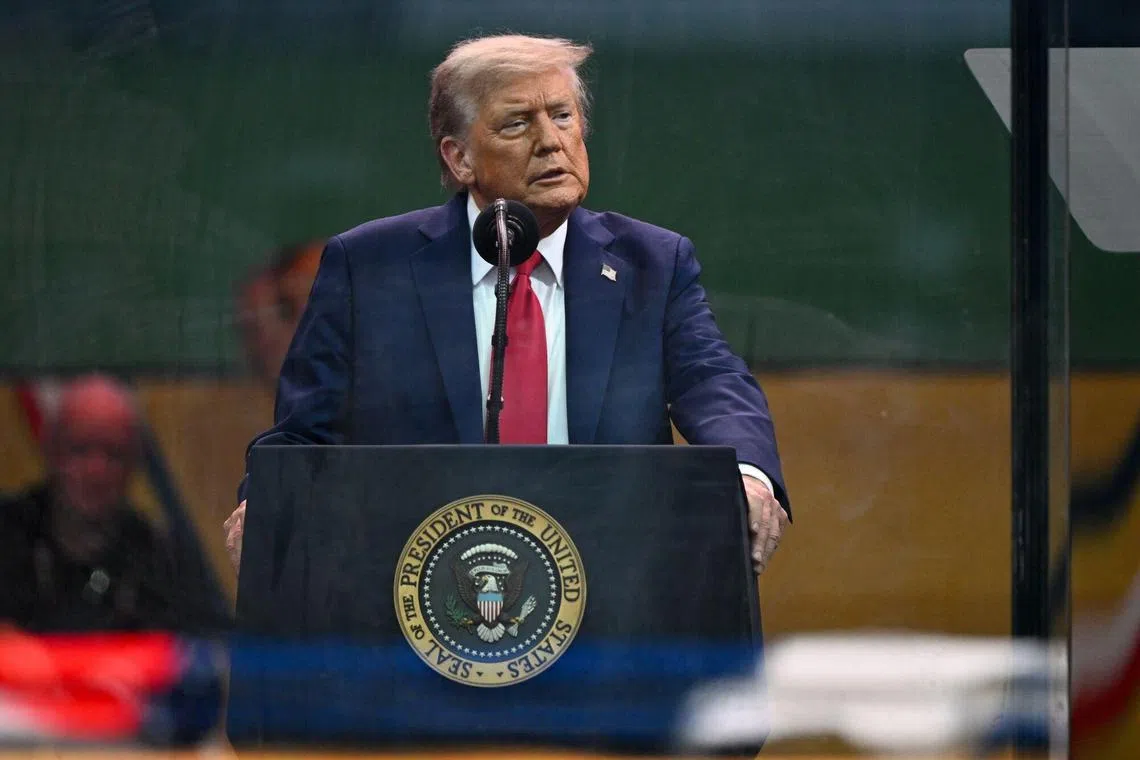US-China trade truce leaves military-use rare earth issue unresolved
Sign up now: Get insights on Asia's fast-moving developments

President Donald Trump said that the handshake deal reached in London between American and Chinese negotiators was a “great deal".
PHOTO: BLOOMBERG
BEIJING/SINGAPORE – The renewed US-China trade truce struck in London
Beijing has not committed to grant export clearance for some specialised rare-earth magnets that US military suppliers need for fighter jets and missile systems, the people said. The US maintains export curbs on China’s purchases of advanced artificial intelligence chips out of concern that they also have military applications.
At talks in London last week, China’s negotiators appeared to link progress in lifting export controls on military-use rare earth magnets with the longstanding US curbs on exports of the most advanced AI chips to China. That marked a new twist in trade talks that began with opioid trafficking, tariff rates and China’s trade surplus, but have since shifted to focus on export controls.
US officials also signalled they are looking to extend existing tariffs on China for a further 90 days beyond the Aug 10 deadline agreed in Geneva in May, both sources said, suggesting a more permanent trade deal between the world’s two largest economies is unlikely before then.
The two people who spoke to Reuters about the London talks requested not to be named because both sides have tightly controlled disclosure.
President Donald Trump said on June 11 that the handshake deal reached in London was a “great deal”, adding “we have everything we need, and we’re going to do very well with it. And hopefully they are too”.
US Treasury Secretary Scott Bessent said there would be no “quid pro quo” on easing curbs on exports of AI chips to China in exchange for access to rare earths.
But China’s chokehold on the rare earth magnets needed for weapons systems remains a potential flashpoint. China dominates global production of rare earths and holds a virtual monopoly on refining and processing.
A deal reached in Geneva in May to reduce bilateral tariffs from crushing triple-digit levels had faltered over Beijing’s restrictions on critical minerals exports that took shape in April. That prompted the Trump administration to respond with export controls preventing shipments of semiconductor design software, jet engines for Chinese-made planes and other goods to China.
At the London talks, China promised to fast-track approval of rare-earths export applications from non-military US manufacturers out of the tens of thousands currently pending, one of the sources said. Those licences will have a six-month term. Beijing also offered to set up a “green channel” for expediting licence approvals from trusted US companies.
Initial signals are positive, with Chinese rare-earths magnet producer JL MAG Rare-Earth, saying on June 11 that it had obtained export licences that included the US. China’s Commerce Ministry confirmed it approved some “compliant applications” for export licences. But China has not budged on specialised rare earths, including samarium, which are needed for military applications and are outside the fast track agreed in London, the two people said. Automakers and other manufacturers largely need other rare earth magnets, including dysprosium and terbium.
The rushed trade meeting in London followed a call last week between Mr Trump and Chinese leader Xi Jinping. Mr Trump said US tariffs would be set at 55 per cent for China, while Beijing had agreed to 10 per cent from the US.
Mr Trump initially imposed tariffs on China as punishment for its massive trade surplus to the US and over what he said is Beijing’s failure to stem the flow of the powerful opioid fentanyl into the US.
Chinese analysts are pessimistic about the likelihood of further breakthroughs before the Aug 10 deadline agreed in Geneva.
“Temporary mutual accommodation of some concerns is possible but the fundamental issue of the trade imbalance cannot be resolved within this timeframe, and possibly during Mr Trump’s remaining term,” said Mr Liu Weidong, a US-China expert at the Institute of American Studies, Chinese Academy of Social Sciences.
An extension of the August deadline could allow the Trump administration more time to establish an alternative legal claim for setting higher tariffs on China in case Mr Trump loses an ongoing legal challenge to the tariffs in US court, one of the people with knowledge of the London talks said.
The unresolved issues underscore the difficulty the Trump administration faces in pushing its trade agenda with China because of Beijing’s control of rare earths and its willingness to use that as leverage against Washington, said Mr Ryan Hass, director of the John L. Thornton China Centre at the Brookings Institution.
“It has taken the Trump team a few punches in the nose to recognise that they will no longer be able to secure another trade agreement with China that disproportionately addresses Trump’s priorities,” he added. REUTERS


